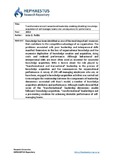| dc.contributor.author | Politis, John D. | |
| dc.date.accessioned | 2016-01-29T07:35:01Z | |
| dc.date.available | 2016-01-29T07:35:01Z | |
| dc.date.issued | 2002 | |
| dc.identifier.issn | 0143-7739 | |
| dc.identifier.uri | http://hdl.handle.net/11728/7137 | |
| dc.description.abstract | Knowledge has been identified as one of the most important resources that contribute to the competitive advantage of an organisation. The problems associated with poor leadership and interpersonal skills manifest themselves in the loss of organisational knowledge and the expensive duplication of knowledge creation and acquisition, rising costs and reduced performance. Although behavioural and interpersonal skills are most often cited as essential for successful knowledge acquisition, little is known about the role played by “transformational and transactional” leadership in the process of knowledge acquisition and the consequences for organisational performance. A survey of 239 self‐managing employees who are, or have been, engaged in knowledge acquisition activities was carried out to investigate the relationship between the components of leadership dimensions associated with Bass’s model, a number of knowledge acquisition attributes and performance. Although results showed that some of the “transformational” leadership dimensions enable followers’ knowledge acquisition, “transformational” leadership is not a pre‐existing condition for achieving desirable performance of self‐managing teams. | en_UK |
| dc.language.iso | en | en_UK |
| dc.publisher | MCB UP Ltd | en_UK |
| dc.relation.ispartofseries | Volume 23, Issue 4 | |
| dc.rights | © MCB UP Limited | en_UK |
| dc.rights.uri | http://creativecommons.org/licenses/by-nc-nd/4.0/ | en_UK |
| dc.subject | Work | en_UK |
| dc.subject | Autonomy | en_UK |
| dc.subject | Empowerment | en_UK |
| dc.subject | Knowledge workers | en_UK |
| dc.subject | Leadership | en_UK |
| dc.subject | Self‐managing teams | en_UK |
| dc.title | Transformational and transactional leadership enabling (disabling) knowledge acquisition of self‐managed teams: the consequences for performance | en_UK |
| dc.type | Article | en_UK |
| dc.doi | 10.1108/01437730210429052 | en_UK |


